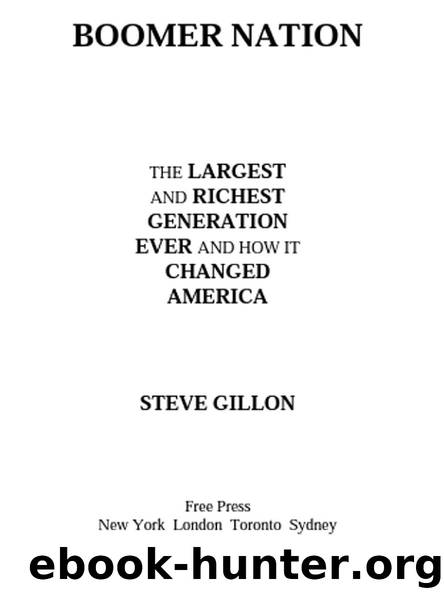BOOMER NATION by STEVE GILLON

Author:STEVE GILLON
Language: eng
Format: epub
Publisher: FREE PRESS
Published: 2004-07-15T00:00:00+00:00
The conflicts within the VVA underscored the confused legacy of the Vietnam War. Even among those who had fought, there were wide variations in experience. Those who fought early in the war were more likely to have positive views of the American effort; those who went to Vietnam after 1969 were more likely to see the war as a mistake. Some have speculated that those who saw combat tended to be more critical of the war than those who served in a supporting role, but there are no surveys to support the claim. Some Vietnam vets were permanently radicalized, participated in protest demonstrations, and became convinced that America needed to curtail its international adventurism. Some became pacifists, believing the United States should fight only if it were attacked. Still others, perhaps a majority, emerged as hawks, believing that the nation needed to maintain a strong presence in the world.
While they may not have agreed on the lessons, all members of the Vietnam generation came away with a profound skepticism of government. Vietnam accentuated the Baby Boom’s instinctive skepticism about authority. Those who refused to fight believed the government had deceived them all along about the nature of the war. Those like Bobby Muller who went to Vietnam believing in the cause were disillusioned by the contrast between the optimistic government reports and the harsh military realities. Later they felt betrayed when many of the same government officials who were so eager to send them off to battle refused to stand by them when they returned. Even veterans who supported the war effort believed the government lied to them about fulfilling the nation’s commitment to defeating communism.
The failure in Vietnam, the Johnson administration’s duplicity in explaining it, and the exposure of Nixon’s illegal behavior in the Watergate affair combined to erode public faith in the integrity of its elected leaders. The journalist Tom Wicker wrote that many Americans had come to look on their government as “a fountain of lies.” “All during Vietnam, the government lied to me,” declared the journalist Richard Cohen. “All the time. Watergate didn’t help matters any. More lies…. I’ve been shaped, formed by lies.” A 1976 study revealed that 69 percent of respondents felt that “over the last ten years, this country’s leaders have consistently lied to the people.” Pollster Daniel Yankelovich noted in 1977 that trust in government declined from 80 percent in the late 1950s to about 33 percent in 1976. More than 80 percent of the public expressed distrust in political leaders, 61 percent believed something was morally wrong with the country, and nearly 75 percent felt that they had no impact on Washington decision making.
For better or worse, Vietnam made the American political process and institutions more responsive to public pressure. It was the cause of Congress’s new assertiveness toward the presidency. The most important sign of that changed relationship is the 1973 War Powers Act, which prevented the commander in chief from sending U.S. troops into combat for more than ninety days without congressional consent.
Download
This site does not store any files on its server. We only index and link to content provided by other sites. Please contact the content providers to delete copyright contents if any and email us, we'll remove relevant links or contents immediately.
| Africa | Asia |
| Canadian | Europe |
| Holocaust | Latin America |
| Middle East | United States |
Fanny Burney by Claire Harman(26603)
Empire of the Sikhs by Patwant Singh(23086)
Out of India by Michael Foss(16853)
Leonardo da Vinci by Walter Isaacson(13336)
Small Great Things by Jodi Picoult(7143)
The Six Wives Of Henry VIII (WOMEN IN HISTORY) by Fraser Antonia(5515)
The Wind in My Hair by Masih Alinejad(5095)
A Higher Loyalty: Truth, Lies, and Leadership by James Comey(4964)
The Crown by Robert Lacey(4817)
The Lonely City by Olivia Laing(4802)
Millionaire: The Philanderer, Gambler, and Duelist Who Invented Modern Finance by Janet Gleeson(4478)
The Iron Duke by The Iron Duke(4356)
Papillon (English) by Henri Charrière(4274)
Sticky Fingers by Joe Hagan(4199)
Joan of Arc by Mary Gordon(4112)
Alive: The Story of the Andes Survivors by Piers Paul Read(4033)
Stalin by Stephen Kotkin(3966)
Aleister Crowley: The Biography by Tobias Churton(3640)
Ants Among Elephants by Sujatha Gidla(3467)
